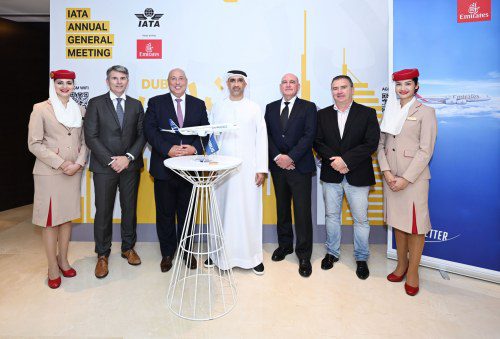Emirates, the International Air Transport Association (IATA) and Airbus have joined forces to deliver an enhanced Competency-Based Training and Assessment (CBTA) programme for the A350 type rating, as the airline prepares for the delivery of 65 A350s from mid-2024. An initial cohort of 256 pilots will be trained as part of the new course at Emirates’ Training college in Dubai starting from July 2024.
The advanced pilot training programme uses the CBTA training methodology that combines IATA’s principles and documentation with Emirates’ operational expertise and resources, and Airbus’ CBTA training experience on the A350 that spans over 10 years.
Driven by pilot competency and behaviour, the A350 CBTA programme utilises the proven CBTA training philosophy that allows instructors to assess the pilots training and seek immediate improvements in their performance. The programme will run in two phases and will include 20 days of simulator training and evaluation in 15 separate sessions.
“With this programme, Emirates’ pilots receive in-house competency-based training with highly qualified instructors, equipping them with world-class capabilities to support the airline’s global operations. The tailored CBTA programme for the A350 supports the integration of the new aircraft to be inducted into our fleet, with 1,000 pilots set to complete the A350 type rating course. This latest initiative is part of Emirates’ commitment to deliver the highest standards of service and comfort while supporting our operational growth and expansion,” said Capt. Bader Al Marzooqi, Emirates’ Senior Vice President, Flight Training.
“Combining the expertise of Emirates, Airbus and IATA to design and deliver A350 type rating training is a unique opportunity. Our joint aim is to fully utilize the benefits of CBTA to qualify the pilots on the A350 in the most efficient and effective way possible. And by doing it together all three organizations will also gain valuable experience that can strengthen their other training activities,” said Nick Careen, IATA’s Senior Vice President for Operations, Safety and Security.
“The A350 is a state-of-the-art aircraft, which requires equally advanced training solutions. Our partnership with IATA and Emirates ensures that Emirates’ pilots receive the most comprehensive and effective training, supporting the smooth entry- into- service of the A350 worldwide,” said Capt Stéphan Labrucherie, Airbus Head of Flight Training Worldwide.
The A350 type rating programme is one of the ways Emirates is prepping the entry of its new A350 into service. Along with pilot training, other parts of the airline are also working on preparing for the debut of A350 operations including Service Delivery and Engineering teams, among other departments.
CBTA and IATA
Gaining the benefits and efficiencies of CBTA training is a longstanding industry objective. For flight crew, IATA is supporting this with its CBTA Guide for Flight Crew Training, which is fully aligned with ICAO CBTA standards and includes specific libraries for Airlines/Operators and Training Organizations.
IATA also focuses on CBTA training in support of the IATA Dangerous Goods Regulations. The IATA CBTA Center supports organizations across the aviation industry, including operators, Civil Aviation Authorities, and training organizations, in developing the capabilities and resources for dangerous goods training programs. It also offers CBTA training specialized for various airline functions from ground handlers, to passenger agents, load planning, crew and others.





















